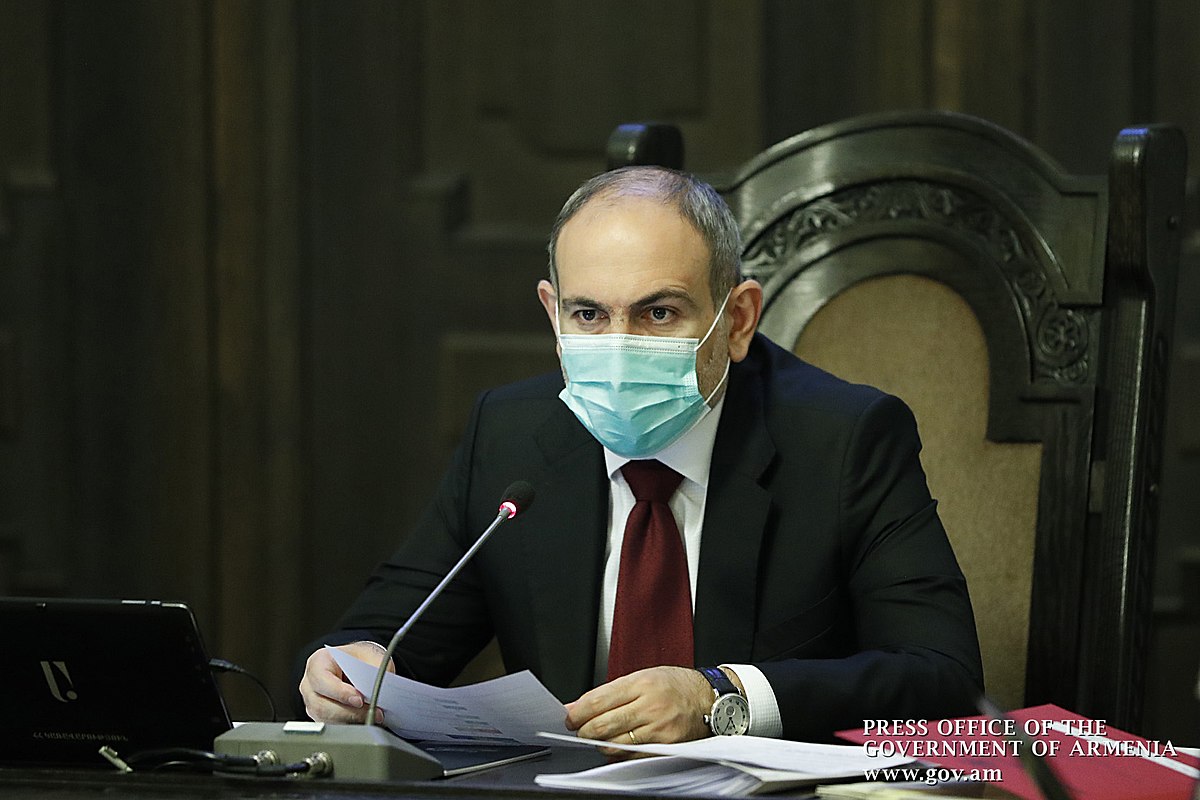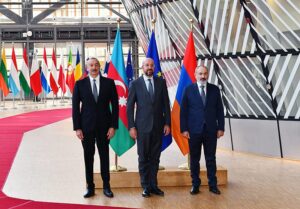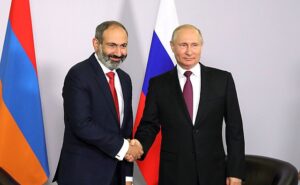Armenia’s Prime Minister Nikol Pashinyan has agreed to hold early parliamentary elections, taking place on June 20 of this year. After long negotiations with the opposition leaders of the two opposition parties represented in parliament, they seem to have come to a consensus. Earlier this month Pashinyan mentioned that he was only willing to hold early elections “under his conditions”. Except for the date, much remains unclear about the elections, such as whether they will be held under the new Reformed Electoral Code, or the old one. What is clear, is that the opposition parties hope to challenge the dominance of the My Step Alliance (My Step) of Prime Minister Pashinyan. Even though Pashinyan still enjoyed steady support during the summer of 2020, his approval ratings dropped drastically after the disastrous Armenian-Azerbaijani war in the fall of 2020. Since then protesters have en-masse taken to the streets to demand early elections and his resignation.
Pashinyan blamed for Armenia’s lost war with Azerbaijan
In December of 2018 Pashinyan and his My Step Alliance (My Step) convincingly won the elections with 70.4% of the votes. Pashinyan remained popular in Armenia until the 44-day long war with Azerbaijan broke out last fall. The war turned out disastrous for Armenia as many of its soldiers fell victim. Furthermore, Armenia had to cede large parts of its territory to Azerbaijan, especially in the Nagorno-Karabakh region. These included territories which Armenia had controlled for over 30 years. Much of the lost territory in the Nagorno-Karabakh region holds a special place in the identity of Armenians. Many Armenians felt betrayed by the Pashinyan government and blame him for the lost war.
As a consequence, after Pashinyan signed a trilateral peace agreement with Azerbaijan and Russia, large scale protests broke out in the country. Protesters and opposition parties have been calling for Pashinyan’s resignation and re-elections. Sixteen opposition parties have united under the name of the Homeland Salvation Movement (HSM). These include the only two parties represented in parliament, Prosperous Armenia (BHK) and Bright Armenia (BAP), as well as all other parties that did not manage to overcome the electoral threshold of 5% in the 2018 election. In January Pashinyan already stated he would be willing to hold early elections, but in February changed his mind. With polls suggesting that My Step is likely to lose its majority, Pashinyan was not eager to put action to word.
Military involvement escalates political conflict
Once the military started to get involved, events transpired quickly. After a long lasting dispute between Pashinyan and the military, the military declared that they “had enough”. The military felt abandoned by Pashinyan, who was critical about the military’s performance during the war. In a letter addressed to the Prime Minister, high placed military officials, among whom Chief of the General Staff Onik Gasparian, demanded Pashinyan’s resignation. Pashinyan was quick to declare that a military coup was unfolding, even though it remained unclear whether the military was willing to back-up its demand with force. In an attempt to block the possible military coup and knowing his strength, Pashinyan presented himself in public in a similar manner to the 2018 peaceful revolution. He rallied his supporters, brought out his megaphone, and marched through the streets of Yerevan.
However, opponents of Pashinyan, encouraged by HSM leaders, continued to swarm the streets as well. Especially in the days after the alleged military coup, protests against the government grew in size, while another conflict erupted over the sacking of Chief of the General Staff Gasparian, between Pashinyan and President Armen Sakisian, who refused to accept the resignation of Gasparian. Pashinyan blamed Sakisian for not helping to resolve the crisis with this action. Sakisian, who mainly holds a ceremonial role, in the end lacked enough power to prevent the sacking of Gasparian. Yet, from all sides pressure increased on Prime Minister Pashinyan, forcing him to find a solution to the ongoing political crisis.
Negotiations between Pashinyan and opposition leaders
In the midst of this escalating political crisis talks between Pashinyan and opposition leaders started. On March 4 negotiations between Pashinyan and Edmon Marukyan, the leader of the BAP, failed to bring about any significant progress. Pashinyan had been clear that elections would only take place under “his conditions”. One of such conditions was that they parliamentary factions would need to declare that they shall not vote for another prime minister if he steps down. Because Pashinyan needs to step down to pave the way for early elections, he wanted to make sure that this would not be blocked by opposition parties putting forward their own options for prime ministers.
The opposition parties’ lack of seats prevents them from realistically presenting a challenge to Pashinyan, but they could stall elections, allowing them time to strengthen their election campaigns. Earlier elections are more favourable to the already well organized government of the My Step party. Furthermore, the earlier election will take place, the less likely they will take place under the new Reformed Electoral Code, which would favour opposition parties. The current Electoral Code heavily favours the party or parties in government, which are in possession of more resources than opposition parties.
On March 18, just after the Pasinhyan met with opposition leader Tsarukyan, of the BHK party, he agreed to early parliamentary elections on June 20 of this year. He did so by announcing in a Facebook post that early elections are “the best way out of the current international political situation”. The two largest opposition parties BHK and BAP have “accepted” the early elections, significantly de-escalating the current political conflict. With the announcement of early elections, Armenian citizens have an “end-date” when the current political crisis will be resolved in a “democratic manner”.
The HSM demanded Pashinyan’s immediate resignation and the instalment of an interim government until the early elections. Accepting that early elections alone were the best thing they could get, the opposition agreed. Initially Pashinyan wanted opposition parties to sign a memorandum stating that they would not vote for another Prime Minister in case Pashinyan stepped down in order to allow for early elections. On this point Pashinyan had to compromise. As said, much is unclear about the exact conditions. The negotiation process was far from transparent as it took place behind closed doors.
Reformed Electoral Code under threat
Since the 2018 revolution there has been a consensus on the fact that the Electoral Code, which significantly benefits those in power, should be altered. Over the past years the Armenian National Assembly, extra-parliamentary parties, civil society representatives, international organizations and various state institutions have been working on a new Electoral Code. Draft amendments propose a simpler proportional electoral system, but it has not been implemented so far. Early elections which would take place with the old Electoral Code would be yet another “competition of resources, rather than platforms”.
The new Electoral code should prevent vote rigging, promote proportional distribution of votes, ensure transparency in party and campaign financing, and strengthen women’s participation. With the early elections it remains unclear whether the reform process will continue. The earlier the elections are held, the less likely it is that they will be held under the new Reformed Electoral Code. Even though many advocate to hold the new elections under the Reformed Electoral Code, it seems unlikely given the early election date and it being against Pashinyan’s interests. However, much can change in a short period of time in the Caucasus country, as we have seen happen over last few months.
Sources: Aljazeera, ARM1, ARM2, AP, DW, Epde, EurasiaNet, Euronews, JamNews1, JamNews2, JamNews3, Reuters, Rferl1, Rferl2
Image: Wikimedia (Nikol Pashinyan)



